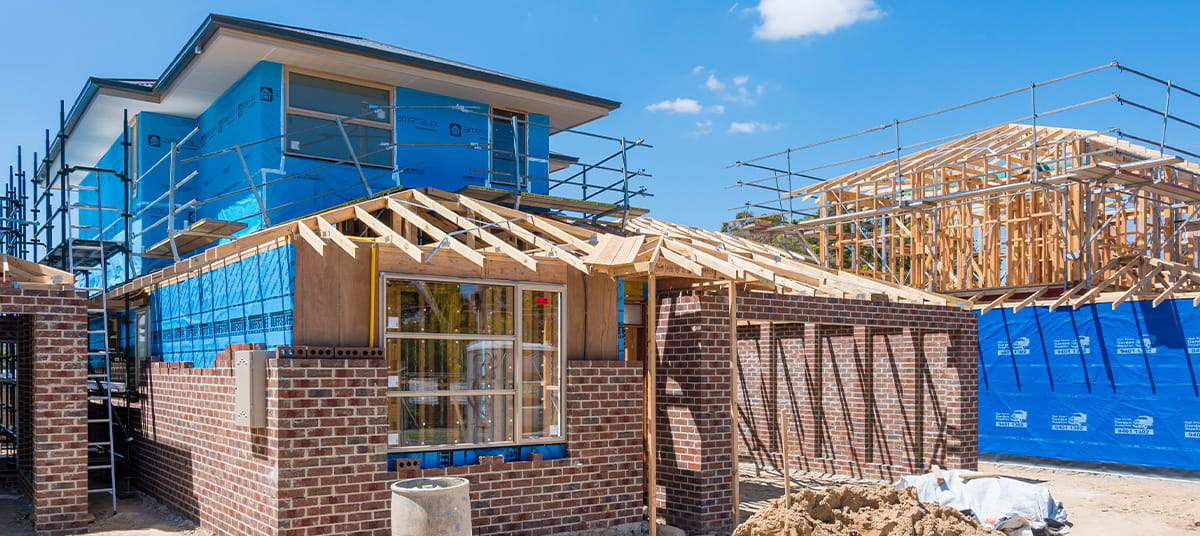
A nosedive in approvals for units drove a decline in total monthly dwelling approvals, pushing the government’s housing target further out of reach.
Dwelling approvals plummeted 8.2 per cent to 15,769 in July, undoing the majority of gains made in June and falling short of market forecasts, according to the Australian Bureau of Statistics (ABS).
In seasonally adjusted terms, approvals for private sector dwellings excluding houses (which includes semi-detached, row or terrace houses, townhouses and apartments) slumped 22.3 per cent after gaining 33.5 per cent in June, highlighting volatility in the unit market.
Private sector house approvals inched up 1.1 per cent to 9,288, after a 1.9 per cent June fall.
Dwelling approvals were geographically uneven in July, with sharp declines in New South Wales (down 24.6 per cent) and a 1.3 per cent drop in South Australia.
Those declines were offset by gains in Tasmania (up 12.2 per cent), Western Australia (rising 11.8 per cent), Queensland (up 5.9 per cent) and Victoria (0.7 per cent higher).
House approvals climbed in most states, led by New South Wales and Western Australia (both up 3 per cent), Victoria (growing 1.3 per cent) and Queensland (ip 0.8 per cent).
South Australia was the only state to fall, down 6.1 per cent.
The value of total residential building fell 1.6 per cent to $9.43 billion, comprised of a 2.1 per cent fall to new residential value (to $8.18 billion) and a 1.9 per cent gain in alterations and additions (to $1.25 billion).
Where to for the national target?
Commenting on the ABS figures, National Australia Bank (NAB) associate economist Michael Hayes and senior markets economist Taylor Nugent noted that approvals over the past year have risen to 184,000.
While the figure leaves approvals higher than soft 2019 conditions, they highlighted that they were “well below levels consistent with the national housing accord target”.
The government has fallen behind on its target under the National Housing Accord to build 1.2 million new homes by June 2029, with a leaked Treasury briefing in July conceding the target “will not be met”.
Recent forecasts from Master Builders Australia has also suggested that 180,500 homes were started in FY25 - almost 60,000 short of the Accord’s annual target of 240,000.
Across the full five-year term, the expected shortfall has now grown to 180,200 homes compared with the 160,000 gap projected in April.
Master Builders Australia chief economist Shane Garrett said the forecasts highlight the scale of demand going unmet.
“Australians are crying out for more housing, but demand is being left unrealised.
“Projects are stalled by rising costs, low productivity and long build times. Without rapid reform, the activity needed to deliver 1.2 million homes will not materialise.
“No state or territory is on track to meet its target. High-density housing must accelerate quickly, but many jurisdictions lack the capacity to deliver at scale. Governments must streamline planning and approvals now to unlock supply.
“The workforce challenge is just as pressing. Construction employment is near record highs, but productivity has fallen 18 per cent over the past decade. Longer build times and higher costs are holding us back. We need more workers across trades and professions to restore capacity and viability,” Garrett concluded.
However, Commonwealth Bank of Australia (CBA) economist Harry Ottley noted that building approvals data is highly volatile, particularly for multi-unit dwellings.
He pointed to trend data that shows total monthly approval figures have been trending higher since late last year, with detached housing approvals broadly flat while multi-units have lifted since March.
In annual terms, trend total approvals are up 11.7 per cent year on year, he highlighted.
Looking ahead, Ottley said: “We continue to expect an improvement in building approval numbers through the remainder of 2025, driven by an interest rate cutting cycle, rising dwelling prices, increased capacity in the construction sector and government policy support.”
Westpac economist Ryan Wells said the drop in approvals marked a “continued run of extreme monthly swings associated with volatility” for units.
However, he added that “the backdrop is becoming more supporting for approvals medium term, underscored by easing cost pressures and burgeoning homebuyer sentiment.”
After the housing approvals data came in lower than expected, the Housing Industry Association (HIA) called for the use of AI to overhaul planning approvals.
“Harnessing artificial intelligence to drive a once-in-a-generation overhaul of planning systems across the country could be the circuit breaker Australia needs to deliver 1.2 million homes over next five years,” Sam Heckel, HIA executive director, planning and environment, said.
“Putting AI to work in planning will help clear the biggest bottlenecks in housing delivery, freeing up planning resources to focus on the complex assessments that need more detailed professional involvement.”
The drop in housing approvals comes the same week that new research shows growth in housing prices has accelerated as momentum in the property market continues to lift prices to record highs.
[Related: House prices accelerate into spring selling season]

